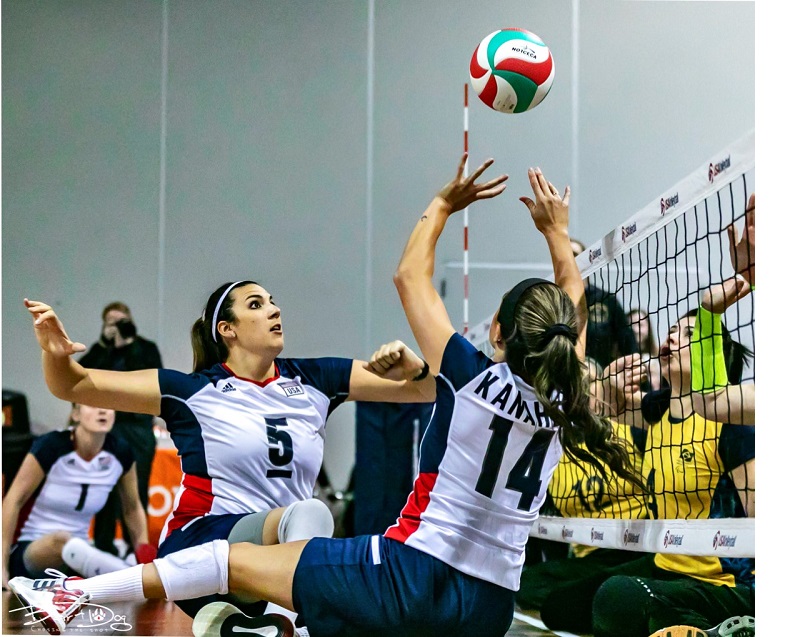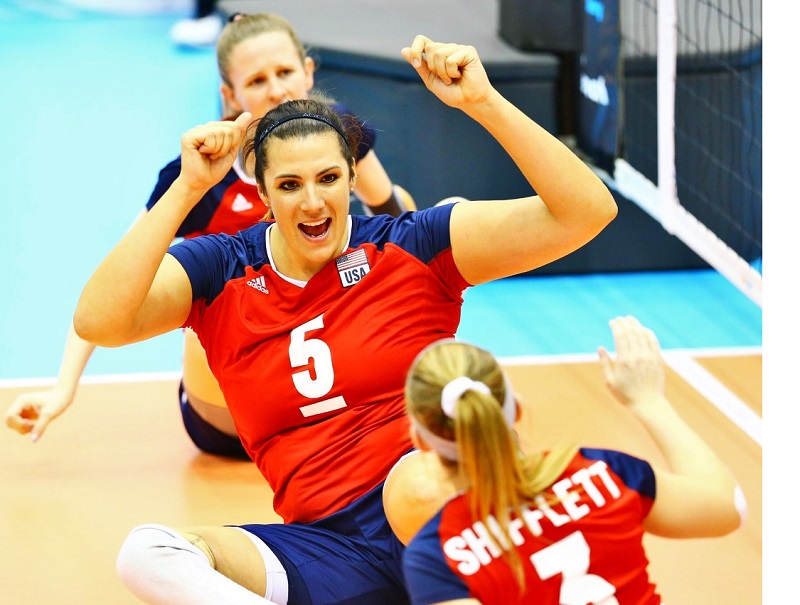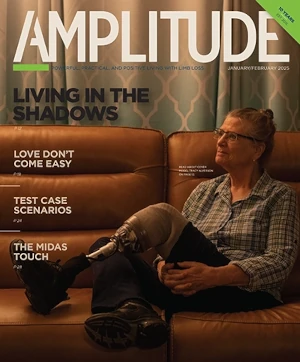
It has been noted here and there that the 2021 Paralympics will mark the first Games in which US competitors earn the same bonus for medals as their Olympic counterparts. These articles rightly note that the achievement isn’t just about the money. It’s also about the principle that para athletics are just as valuable as the able-bodied variety—and, by extension, that people with disabilities are just as valuable as those without.
Not surprisingly, it took a real battle to get this seemingly uncontroversial principle enshrined in the US Olympic and Paralympic Commitee’s bonus table. We got a glimpse of that story last summer when we talked to below-knee amputee Katie Holloway (#5 in the photo), one of the Paralympians who led the fight. Holloway and her teammates on the US sitting volleyball team earned $5,000 each for their gold medals at the 2016 Rio Paralympics, just 20 percent of the $25,000 payout for an Olympic gold medal. The inherent unfairness of that inequity seemed lost on the powers-that-be, and it took a dogged effort to get them to see it.
Holloway picks up the story below, in a condensed version of last year’s interview. You can read the article in its entirety here. Images by Steve Gentry @bairdogVP.
Walk me back to the beginning of when Paralympic athletes first began talking about pay equity.
In December 2016, the USOC Board of Directors comes out with this announcement that they are increasing everyone’s bonuses by 50 percent, both Olympians and Paralympians. Numberswise, we went from a situation where Olympians made $25,000 for gold and Paralympians made $5,000, to having Olympians make $37,500 for gold and Paralympians were making $7,500 for gold. So if you’re doing the math, we went from making $20,000 less [than Olympians] to making $30,000 less. The difference got bigger. That decision was so incredibly disrespectful to all of us.
And they were presenting this as if you should be grateful, because it was an equal increase across the board?
Correct. So in my position as an athlete representative [on the Athletes’ Advisory Council], I knew the governance structure really well. The Paralympics suffers because of the governance structure and athlete representation. So I went directly to the three athlete representatives on the Board of Directors who had made the decision. And at the time they said the same thing: “We made it equal. Everybody got the same increase, 50 percent.”
At the time of the decision, we had no Paralympic athletes on the Board of Directors. We had what they called the chief of Paralympics, who was in effect an able-bodied representative of what’s called the Paralympic Advisory Committee. But he wasn’t an athlete.
I wrote a pretty formidable email first to all three athletes on the Board. And I won’t say I was the only one. I probably was the strongest one protesting to them, but I’m sure there were other conversations being had. And I will give them the benefit of the doubt. I think they were very unclear as to how this decision seemed unequal to me. They were trying to get to the bottom of why I was upset, but they were in full agreement that it was an equitable decision and that they had made every consideration to be fair to all of the athletes.
In 2017 I became a vice-chair of the AAC. At one of our first meetings that year, I stood up and proclaimed my sense of feeling slapped in the face and not understanding how we were expected to accept this as fair. And that’s where the conversation turned to, “You generate less revenue. Paralympians generate less than 1 percent of the revenue.” And I spoke up again and said, “If that were really the case, then by that logic you would give all the money to Michael Phelps, Simone Biles, and Katie Ledecky. You would give it all to the athletes who generated the highest revenues for you, and not to the Olympic athletes from minor sports.”

It doesn’t sound like you got very far in that meeting. Do you feel like you dented the armor somehow?
To be honest, I have never felt like I dented the armor. I know that’s probably not true, but at every step of the way that’s how it felt. Throughout 2017 we would continue bringing it up, and I don’t remember anything too significant happening in those meetings. We kept hearing over and over, “The pie is only so big, and it can’t grow. Would you like us to cut programs so you can all get your bonus money?” And I’m like, “No!”
One thing that did happen is that a former Paralympic athlete got named to the Board of Directors. But it was this very weird independent position. It wasn’t an athlete role. It was their way of saying, I think, “We know we need a Paralympic voice, so here you go.” In my own opinion, it was just an effort to get a “safe” Paralympic voice.
In 2017 we put together a working group called Operation Gold to look at the bonuses. There were both Olympians and Paralympians involved. Obviously it was mostly Paralympians, but there were a lot of Olympians who were mindful that this was a very hot topic, and they were worried about it. Wet set out to figure out the numbers, break down all the decision making, and figure out what was actually happening so we could propose some alternatives. It was like pulling teeth to get numbers out of the staff of what [USOPC’s] 2016 revenues were and who got what bonuses. They gave us these spreadsheets, but they’d scrubbed all the names, and so we had to decipher everything. We went through all of this on the working group, and we’d have these conference calls with really good conversations to think this through and propose a plan that doesn’t screw anyone, Olympian or Paralympian.
So then we started channeling our ideas through our athlete reps on the Board. I’ll never forget one conversation I had with Steve Mesler. He’s an interesting person. Steve is a bobsledder, and I think that publicly he is very Paralympic-friendly, but I think his ability to see the whole picture gets clouded sometimes. I had this conversation with him—I can’t pinpoint when it was, but it was right when the Board had actually started to look at the numbers we were generating on the AAC working group. The Board was discussing all these other options, like what it would take to get our bonuses to 50 percent [of Olympic bonuses], and he finally said, “I’ve decided we’re just not solving the problem if we don’t make them equal.”
I just remember having this funny moment of like, “You’re finally getting it,” and him being really mad that I was reacting like that. I said, “Well, of course I’m really glad this is where you’re at. I’m just letting you know this is what we’ve been asking for all along.”
So Steve had the revelation, and I think he became a champion for us finally. I think attitudes started shifting. From what I hear about the actual decision, the Board talked about the bonuses at consecutive board meetings. And one meeting before they made the decision, they talked to the financial person in charge—not the staff, but the person on the Board who was sort of the head of the financial committee. And he told them, “We have a rainy-day fund, and it’s enough. We can do this.” And so they made the decision to go equal. [The decision was made retroactive to reward medalists from the 2018 Winter Paralympics—but not 2016 Rio medalists.]
One of the lessons I’ve learned from this whole scenario is that it’s not my job as an athlete or an athlete representative to figure out the numbers. It is my job to tell you how athletes are feeling and what they want, and to share with you why it matters and what it ultimately means. I’m there to share the athlete voice and try to do it in a thoughtful and meaningful way. But I can’t make sense of the numbers if you’re not giving them to me. And I feel like that’s what they were doing for two years. I felt like they were saying that if we couldn’t figure out the numbers for them, there’s nothing they could do. And we looked really hard at the numbers and we gave them ideas, but that’s not what finally convinced them. It still didn’t feel like the organization itself had embraced the full equality of Paralympians.
Throughout this whole process, I had been fighting for an active Paralympic athlete to be on the USOC Board of Directors in one of the three athlete roles. I wanted that written into the bylaws. Those were the two goals I laid out when I ran for vice-chair of the AAC: to get a Paralympic athlete on the Board, and to change the bonus equity.
Click here to read our full, unabridged interview with Katie Holloway.



